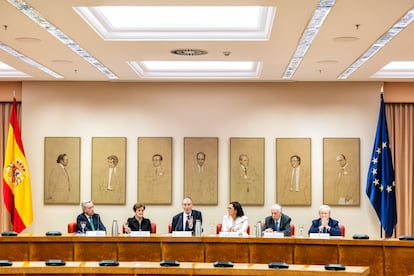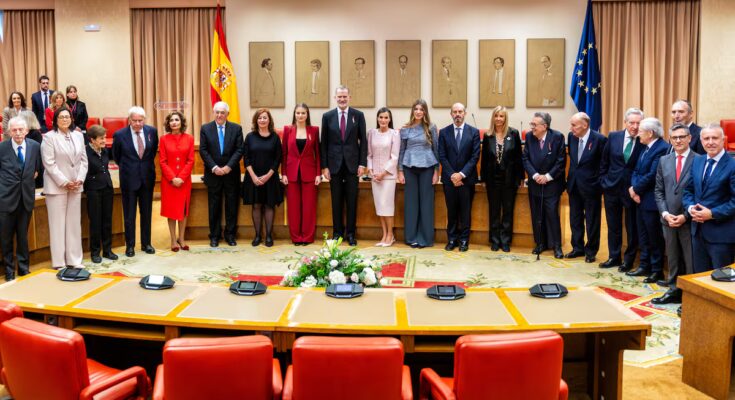The Constitutional Chamber of Congress was filled this Friday with deputies and officials of the PSOE and the PP in the institutional event to commemorate the fiftieth anniversary of the proclamation of Juan Carlos I as king of Spain after the death of the dictator Francisco Franco. The current king, Felipe VI, participated in the event in which the bipartisanship hoped for the best times of the consensus of the transition with the entire royal family and claimed for his part the validity of the “parliamentary monarchy” as a “beautiful idea of the best of what we are”. The historians and journalists who moderated the event appealed to that mythical “concord” of the first years of this democratic phase to now yearn from current politics in search of “minimum shared ethical and civic values”.
The Congress also wanted to celebrate those epochal days of 50 years ago, when Franco died and Juan Carlos I was proclaimed king and promoted, in a few months, the entire political reform that went from dictatorship to a liberal parliamentary democracy. This Friday the tribute took place in a sort of conversation between historians and politicians who were protagonists of that scene, moderated by veteran journalists Iñaki Gabilondo and Fernando Ónega, who asked them questions.
King Felipe VI, Queen Letizia, Princess Leonor and Infanta Sofía listened to all the speeches and the monarch closed the speeches with a shorter speech than the morning one at the Royal Palace in which he praised the work carried out in recent years by the Congress as the seat of the “collective imagination” which “embodies the idea of a reunited Spain” and defined the validity of the parliamentary monarchy for its function of “bridge, balance, continuity and conciliation”. The King concluded by teaching his idea of democratic Spain: “A beautiful idea that embodies the best of who we are; what we aspire to; the sum of our dreams, desires and illusions.”
In the packed room, the most symbolic and emblematic of the Congress, deputies and officials of the PP and PSOE, current and former, sat with various members of the Government, such as the first vice-president, María Jesús Montero, the Minister of Justice, Félix Bolaños, the Minister of Territorial Administration, Ángel Víctor Torres, because President Pedro Sánchez was already traveling for the G20 summit in South Africa, but also the opposition leader, Alberto Núñez Feijóo, the president of the Constitutional Court, the members of the Council of State, the Judiciary, the two living spokesmen of the Constitution awarded the Golden Fleece, the former president Felipe González, the presidents of the Congress and the Senate, and former veteran leaders of both formations. There was no one from Vox, nor from the diverse group of nationalist and left-wing parties that support the socialist government.
Iñaki Gabilondo was the first to spare no praise for any of the historical protagonists of that moment, which he praised as a “democratic undertaking” and in that chapter he did not forget to attribute the founding credit to Juan Carlos I. The historian Juan Pablo Fusi took up that challenge and also praised the figure of the king emeritus as co-author of “the story of a success rarely seen in our contemporary history for the re-foundation of Spain as a democratic country”. Gabilondo recounted the feelings of “uncertainty and fear” of that moment to underline that the word that united everything was “concord” and “the resounding desire not to return to old habits”.
The professor of ethics and philosophy Adela Cortina then held a lesson on that political and citizen commitment to relegate the “discords” of other times, to seek what unites against what separates and called attention, as a parenthesis that sounded like a warning to the current leaders, that “the polarization that divides us makes no sense” nor “stretching the limit” the worse the betterCortina once again disproved, with the result of the transition, that myth that tormented Spain according to which it was a country that could not live in democracy, but asked that the current leaders begin to “seek a moral code and civic ethics with existing shared minimums” to improve people’s lives. Cortina further argued that “parliamentary monarchy” continues to be an “extraordinary platform” to achieve these goals.

The former president of the Senate, the socialist Juan José Laborda, reflected extensively on the need for “consensus and reconciliation”, then as today, underlined the importance of Spain’s integration into Europe and concluded his speech with a request “to the Government and the opposition: please, say it, we did it”. The historian Juan Pablo Fusi, studying this entire democratic phase and the global context, concluded that “the monarchy is a very reasonable framework” and especially the eight Europeans and parliamentarians, who he generally described as “dignified, discreet, not sumptuous, nor courtly, exemplary and transparent”. In the case of the Spanish woman, he advised her, as did the King, to take care to maintain her social conscience.
Cortina and Laborda addressed the concept of “exemplarity” and the philosopher wanted to quote José Ortega y Gasset to add: “There is wealth only in countries where three-quarters fulfill their obligations”. And she addressed the advice to the entire royal family who was listening: “The King is reliable, he deserves trust, which is the best thing you can say to a human being.” Gabilondo said: “The monarchy will only serve if it is needed.”



